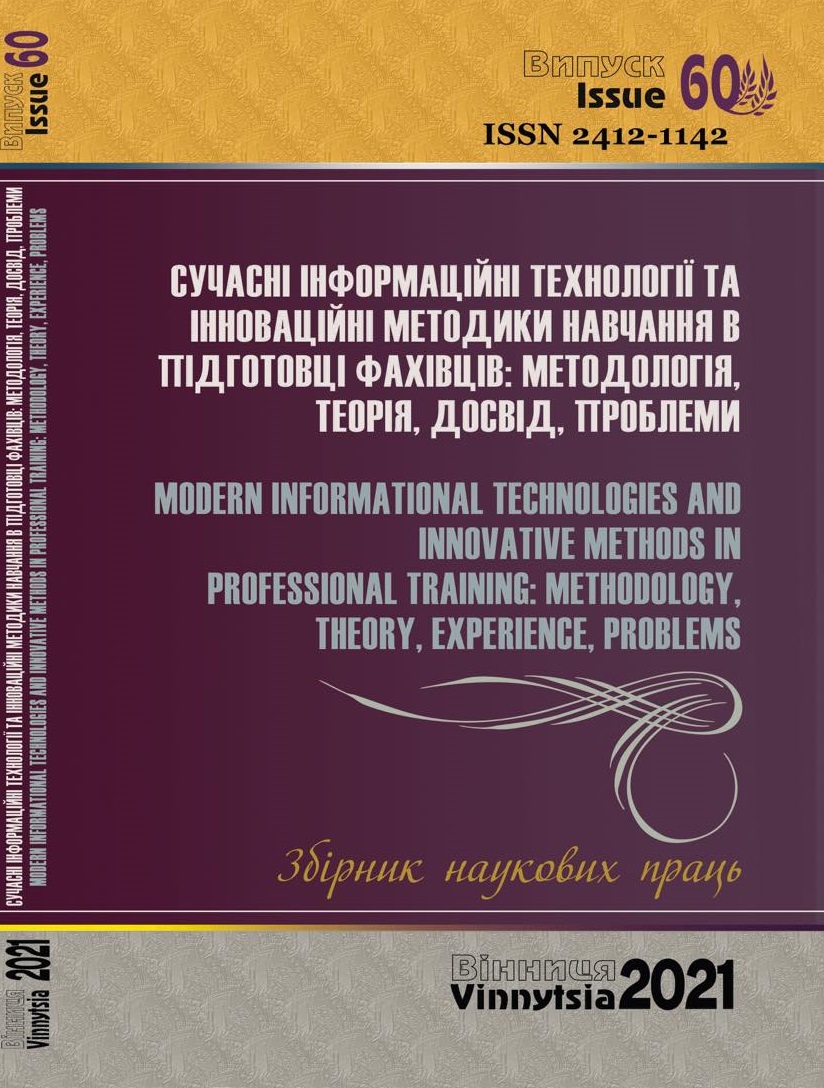ENSURING THE QUALITY OF TRAINING OF QUALIFIED WORKERS WITH THE USE OF SMART-COMPLEXES OF EDUCATIONAL DISCIPLINES
DOI:
https://doi.org/10.31652/2412-1142-2021-60-30-39Keywords:
SMART-complex of academic disciplines, information and communication technologies, information and educational environment, teacher, competence of pedagogical workers in the development of academic disciplines` SMART-complexesAbstract
The methodical bases of SMART-complex development for training of skilled workers are
substantiated (organic combination of hypertext and multimedia educational information; complementarity
of real and virtual components of the educational environment; compliance with educational professional
standards). There is identified strong (significant expansion of training of skilled workers; small financial
investments of vocational education; the possibility of inclusive education, personalized learning;
efficiency of accounting and control of training, etc.) and weak (lack of strategy and tactics of SMART-
complexes in the educational process; insufficient development of information infrastructure in some
regions; lack of teacher training system using SMART-complexes; insufficient investment in innovative
information technologies, etc.) aspects of development and application of SMART-complex in vocational
education. The conceptual model of academic disciplines` SMART-complex as information-dynamic
system of electronic educational resource of educational-methodical direction, built on constant
development and change of functional connections and relations is developed. SMART-complex of
academic disciplines has static, dynamic and environmental components; contains modules: educational
content, system of its delivery to users, system of preparation and system of participants’ estimation of
educational process. The method of preparing teachers for the development of SMART-complexes for the
training of skilled workers in the agricultural, construction and engineering industries is created, covering
six stages (organizational and target, content, structural, design, generalizing, procedural). Criteria and
indicators for assessing the competence of teachers in the development and use of SMART-complexes are
substantiated.
Downloads
References
Стратегія людського розвитку. Указ Президента України від 2 червня 2021 року No 225/2021. URL:
https://zakon.rada.gov.ua/laws/show/225/2021#Text.
Биков В. Ю., Гуржій А. М., Шишкіна М. П. Концептуальні засади формування і розвитку хмаро
орієнтованого навчально-наукового середовища закладу вищої педагогічної освіти. Сучасні
інформаційні технології та інноваційні методики навчання у підготовці фахівців: методологія, теорія,
досвід, проблеми : зб. наук. пр. Вип. 50. Київ-Вінниця: ТОВ фірма «Планер», 2018. С. 20-25.
Радкевич В. О. Сучасні тенденції розвитку професійної освіти. Актуальні проблеми технологічної і
професійної освіти. Матер. Міжнар. наук.-практ. конф., 14 травня 2020 р. Глухів: Глухівський НПУ
ім. О. Довженка, 2020. С. 61-66.
Лазаренко Н. І., Гуревич Р. С., Кізім С. С. Трансформаційні процеси в освіті: методологія, теорія,
досвід, проблеми (ХV міжн. наук-практ. конф. у Вінниці). Вісник Національної академії педагогічних
наук України. 2021. Т. 3 No 1. С. 1-13. URL: https://doi.org/10.37472/2707-305X-2021-3-1-3-2.
Криворот Т. Г., Пригодій М. А. Використання мережевих навчально-методичних комплексів у
фаховій підготовці майбутніх викладачів. Професійна педагогіка. 2020. Т. 1. No 20. С. 109-118. URL:
https://jrnls.ivet.edu.ua/index.php/1/article/view/586.
Гуревич Р. C., Кадемія М. Ю. Смарт-освіта – нова парадигма сучасної системи освіти. Теорія і
практика управління соціальними системами: філософія, психологія, педагогіка, соціологія. 2016.
No 4. С. 71-78.
Kengam J. Artificial intelligence in education. URL: http://dx.doi.org/10.13140/RG.2.2.16375.65445.
Holmes W., Bialik M., Fadel Ch. Artificial Intelligence in education promises and implications for teaching
and learning. The Center for Curriculum Redesign, Boston, MA, 2019. 37 p. URL:
https://curriculumredesign.org/wp-content/uploads/AIED-Book-Excerpt-CCR.pdf.
Пригодій М. А., Гуменний О. Д., Зуєва А. Б. Методичні рекомендації з розроблення SMART-
комплексів для професійної підготовки кваліфікованих робітників аграрної галузі. Житомир:
«Полісся», 2019. 58 с.
Жуков Д. О., Самойлов И. В. Моделирование управления компетенцией учащихся на основе
уравнения Колмогорова и решения краевой задачи. Качество. Инновации. Образование. 2008. No 4. С.
-8.
Жуков Д. О., Самойлов И. В. Модель самоорганизации знаний в процессе управления знаниями.
Качество. Инновации. Образование. 2008. No12(43). С. 46-53.
Downloads
Published
Issue
Section
License
Copyright (c) 2021 Андрій Гуржій, Валентина Радкевич, Микола Пригодій

This work is licensed under a Creative Commons Attribution 4.0 International License.

